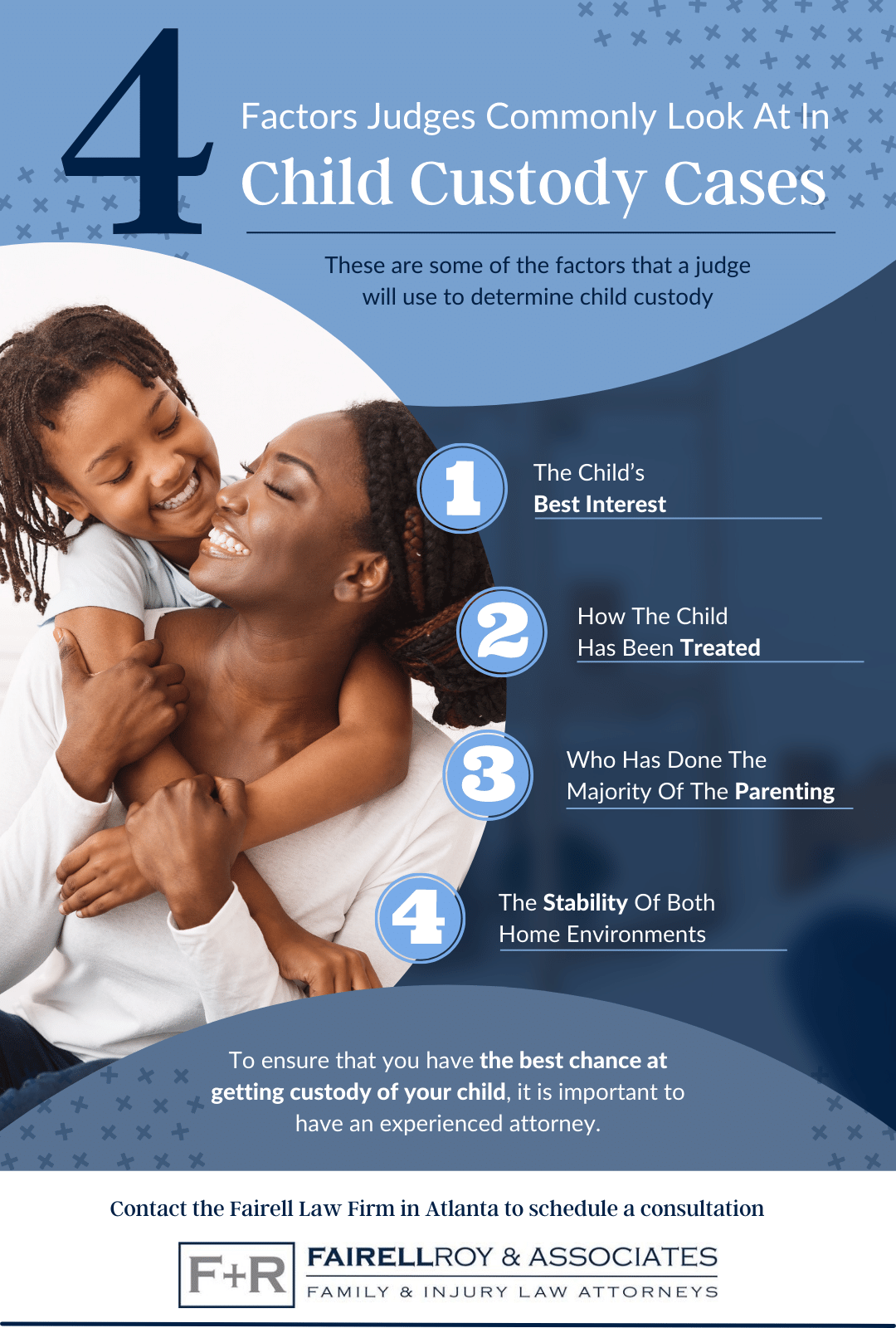Practice Areas
Blog Categories
What Judges Look For in Child Custody Cases: 4+ Factors You Should Know
If you are going through a child custody case, it is important to understand the factors that judges commonly look for. There are many things that judges consider when making their decision, and each case is different. However, there are some common factors that come into play in almost every child custody case. In this blog post, we will discuss four of the most important factors that judges take into account. If you need a
child custody lawyer that understands the system on a very deep level, contact The Fairell Firm in Atlanta.

The Child’s Best Interest
The first factor that judges commonly look at is the child’s best interest. This is the most important consideration in any child custody case and most of the other factors that they look at are under this umbrella. Because a divorce can be difficult on children, judges want to do everything they can to limit the stress that a custody battle can place on a child.
A child’s age is another big factor in custody decisions, as it affects their developmental needs and the type of care required. For instance, very young children in the sensorimotor or preoperational stages (typically ages 0-7) often need stability and continuous presence from their main caregiver, which can influence the court’s decision. For older children who are in the concrete operational stage, judges may also consider their preferences and decision-making power if deemed mature enough.

How The Child Has Been Treated
Another important factor that judges often consider is whether one parent has been abusive or neglectful towards the child. If there is evidence that one parent has abused or neglected the child, they are much less likely to gain custody of their child.

Who Has Done The Majority Of The Parenting
Another factor that judges often take into account is which parent has been more involved in raising the child. Judges typically prefer to award custody to the parent who has been more involved in the child’s life. This includes things like taking the child to school, doctor’s appointments, and extracurricular activities. By awarding custody to the parent who is already most involved in the child’s life, they are helping to maintain as much of a routine as possible during a potentially chaotic time.

The Stability Of Both Home Environments
Finally, judges often consider the stability of each parent’s home environment. They will look at things like whether each parent has a stable job and a place to live. Judges typically prefer to award custody to the parent who can provide a more stable home environment for the child.
Additional Considerations
Impact of Parental Conduct on Custody Decisions
Judges closely examine each parent’s conduct, both past and present, when making custody decisions. Issues like substance abuse, criminal history, or any involvement in domestic violence can heavily influence the court’s ruling. These factors raise serious concerns about a parent’s ability to provide a safe environment for the child. If there is a history of substance abuse, for instance, the court may limit custody or require supervised visitation to ensure the child’s safety.
In addition to safety concerns, judges also observe how each parent behaves toward the other. Demonstrating respect and
avoiding disparaging comments about your co-parent can work in your favor. Conversely, parents who undermine the child’s relationship with the other parent risk a negative impression in court. The judge wants to see that you’re capable of encouraging a healthy, cooperative dynamic, which ultimately serves the child’s emotional well-being. Focusing on
respectful co-parenting and responsible behavior is key to securing a positive custody outcome.
Well-Being of the Parents
Judges consider the physical and mental well-being of each parent since it directly impacts their ability to provide a stable, nurturing environment. A parent’s overall health, including any untreated health problems or disabilities, plays a role in determining custody, particularly when these factors may affect child development awareness or supportive parenting. It’s also important for parents to demonstrate access to necessary health care and a stable financial situation to ensure they can maintain a healthy lifestyle.
Moral fitness and positive relationships within the family are also indicators of a parent’s capacity to serve as a role model. Family support systems further bolster a parent’s ability to provide consistent, nurturing care without compromising their own health.
Location of Child’s Siblings
In custody cases, judges often consider the location of a child’s siblings, as maintaining sibling bonds is crucial to the child’s emotional well-being. Keeping siblings together is generally favored, especially if they share a strong relationship that supports each other’s growth and resilience. However, in cases where older children or siblings experience difficulty getting along—perhaps due to bullying or a strained dynamic—the court may explore separate custody arrangements to ensure the safety of a child.
The court may also consult with a mental health professional, such as a psychologist, to evaluate the sibling relationships and how they impact the
children’s best interests. Judges look to create custody agreements that preserve positive relationships among siblings while fostering a nurturing environment.
Role of Evidence in Custody Cases
In custody cases, evidence is crucial in demonstrating your fitness as a parent. Judges look for clear documentation that showcases your active role in your child’s life. This might include keeping a parenting journal where you record caregiving tasks, like school pickups, medical appointments, and extracurricular activities. These records provide a tangible way to illustrate your commitment and involvement.
Witness testimony from family members, teachers, or therapists can support your case by offering firsthand insights into your parenting. Financial records, such as receipts for child-related expenses, are also helpful in showing your contributions to your child’s well-being. When gathering evidence, be sure to organize it meticulously and present it in a way that is easy for the judge to review. Solid documentation not only strengthens your case but also shows the court your dedication to providing a stable and supportive environment for your child.







